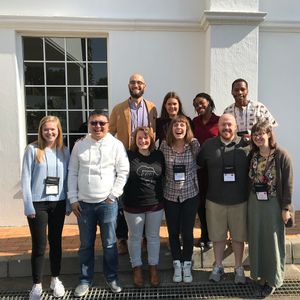The Global Young Peoples’ Convocation

The Global Young Peoples’ Convocation of the United Methodist Church was held from July 18 to July 22 in Johannesburg, South Africa. This gathering sought to bring together youth, young adults, and those who work with youth from around the global United Methodist connection in order to develop relationships across geographic and language barriers, legislate and issue statements on issues important to young people, and navigate the significance and meaning of being a global church in a modern context. Dominic Mejia, a rising second-yearMDiv student at BU School of Theology, attended the event as a voting delegate with support from the Center for Global Christianity.
The Global Young Peoples’ Convocation was a microcosm of the hopes, fears, frustrations, tensions, and possibilities found in the United Methodist Church as a whole. The theme phrase and the focus of many sermons and reflections, “United We Go,” captured these and placed them uncomfortably yet powerfully before those who were told repeatedly, “you are not the future of the church, you ARE the church!”
Of first importance is what it means to be “united.” We heard speakers who asked us to place what were referred to as our soapboxes to the side, coming to conversations without an agenda and to allow ourselves to be brought into unity found in the Holy Spirit. This understanding of unity must be pushed back upon. How do we lay aside that which makes us who we are? How can we as a church be satisfied with a cheap unity based not upon loving community but upon silence on that which is most important? Unity is found in the Holy Spirit, yes, but I doubt the Spirit is calling us towards stagnation and apathy. The unity statement passed by the legislative body calls for unity that challenges injustice while simultaneously moving us to be a global church and to hold the tensions and inconsistencies of doing so. Unity that does not hear the voice of less-powerful and minority voices is not true unity.
The active “go” found fertile ground in the Convocation. The body passed legislation that challenged extreme nationalism, called the church to account for being lax in combating sexism, sexual harassment, and gender-based discrimination, submitted suggested changes to the Social Principles of the United Methodist Church in order to protect refugees and undocumented persons, condemned arranged child marriages, emphasized the importance of local churches in ministering to young people, and issued the previously mentioned unity statement. This reflects a deep desire found among many of those gathered in Johannesburg – young people want to be a part of a church that has something to say about the social, political, and spiritual contexts people find themselves in. Young people worldwide desire to be part of a church that calls systems and people to do and be better, to care more deeply for people and creation and does not strip the transcendent God of God’s ability to be present in the particular lived realities.
The legislation passed by the Convocation will be submitted to the 2020 General Conference of the United Methodist Church. If the Convocation truly does represent more than the future of the church but the present reality of it then it is the responsibility of the General Conference to listen and respond to these uplifted voices of young people.